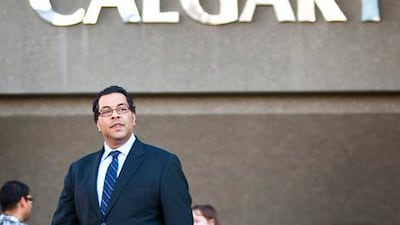CALGARY // A staid prairie city known for producing brash politicians who talk fast on spending cuts and western values, Calgary seemed an unlikely place to stage the rise of Naheed Nenshi.
But this week, this conservative, sprawling city elected Mr Nenshi to be Canada's first Muslim mayor of a major city.
His is a storybook success; a son of Tanzanian immigrants and Harvard graduate who beat two better-funded establishment figures to win the city's top job.
"I think our win says that Calgary is probably one of the leading places in the world in terms of multiculturalism and pluralism. I grew up here and people see me as a Calgarian. They looked at my ideas and platform.
"The question of background and faith never came up in the campaign," Mr Nenshi, 38, said.
Mr Nenshi said he won because he presented the electorate a meticulous platform of managed city growth, infrastructure improvements and reasoned spending decisions. He said his provenance and religion were unimportant.
"They weren't relevant to the decision that the voters were making. At that time, the voters were focusing on who was the best person to be mayor," Mr Nenshi said.
The son of two Ismaili Muslims, Mr Nenshi grew up in Calgary, where about 14 per cent of the people belong to a minority group and fewer than 2 per cent are Muslim.
He attended the University of Calgary, where he studied business. He earned a master's degree in public policy from the John F Kennedy School of Government at Harvard University and was picked to work at the renowned international business consultancy McKinsey & Co at the age of 22.
Forgoing a lucrative job in Geneva, he returned to Calgary more than a decade ago.
"I really wanted to come back to the community that I love so much," he said. "There were also very serious family concerns. My dad was ill and, boy, it was the best decision I ever made."
In Calgary, he began his own small business and became a professor of not-for-profit management at Mount Royal University. He also became a regular city hall columnist for the Calgary Herald.
His campaign success has been largely pegged to an alchemy of Twitter, Facebook and the elusive youth vote.
But for David Taras, a political analyst and professor at Mount Royal University in Calgary, Mr Nenshi tapped into a wider desire for change created by decades of urban sprawl, transportation problems and an opaque, established government.
"There was a mood for change. People were very upset about higher taxes during a time of economic despair. Traffic was hell people were living in and continue to live in. There's an increasing worry about being safe," he said.
While other candidates relied on barbs and sound bites, Mr Nenshi offered lucid, lecture-like talks on YouTube about management and growth.
"It was the intelligence of the conversation, the fact that he was trying to come to grips with the issues that compelled people," Mr Taras said. "It's fertile ground for change."
A candidate such as Mr Nenshi is revolutionary for Calgary, a city long stereotyped by the rest of Canada as a haven for rednecks and cowboys.
Its largest festival, the annual stampede, revels in cowboy hats and cattle roping and steer wrestling. Every election, its electoral maps showing the winners are coloured in the sharp blue of the federal and provincial conservative parties.
"It's the whole question of the image of Calgary, which has always been a city run by agricultural and oil elites, overwhelmingly white and Christian," Mr Taras said.
To some, Mr Nenshi's win is even more surprising when placed against a global backdrop in which some western countries are questioning multiculturalism in the face of increased racism, economic insecurity and the struggle to blend Muslim immigrants into societies that resist many traditional Islamic values.
"Internationally... there have been problems integrating Muslims into Europe. There, it is contested space. It has been very rough and there has been a lot of injustice," he said.
Mr Nenshi acknowledges this is what is behind his sudden media interest. The mayor-elect has conducted dozens of interviews with national and international news organisations since his election on Monday.
"There was also this moment for it with Angela Merkel declaring multiculturalism in Germany as a failure, and here I was, this success story," he said, referring to the German chancellor's comments.
And although he is willing to capitalise on the attention, he knows his job lies at home.
"I was fortunate to come to Calgary at a pivotal point in city's history, when it's transitioning from a big small city into a small big city. It's a wonderful opportunity to engage people and make the place I love a better place to live," he said.
In the meantime, he hopes other young Canadians who are from minority groups can look up to his success. "I just hope that on Tuesday morning after the election, when kids all over city of every ethnicity woke up and mum and dad opened the newspaper or turned on the TV, I hope those kids thought, 'I live in this amazing city and country because I can be anything.'"

